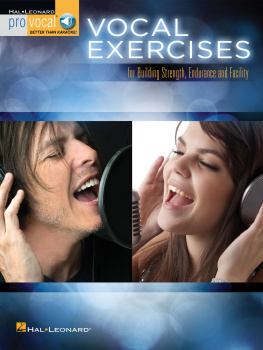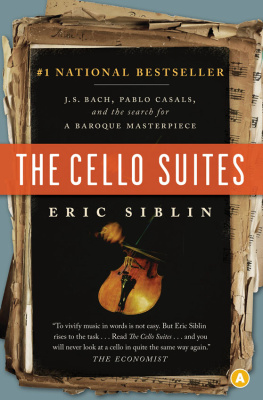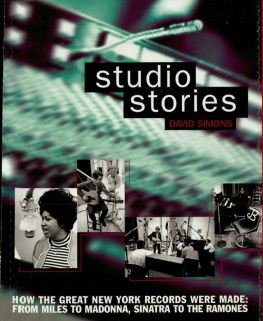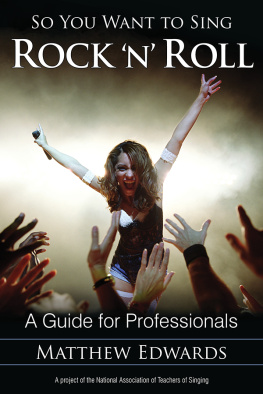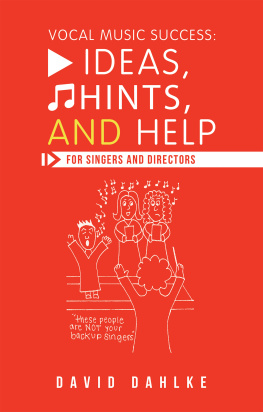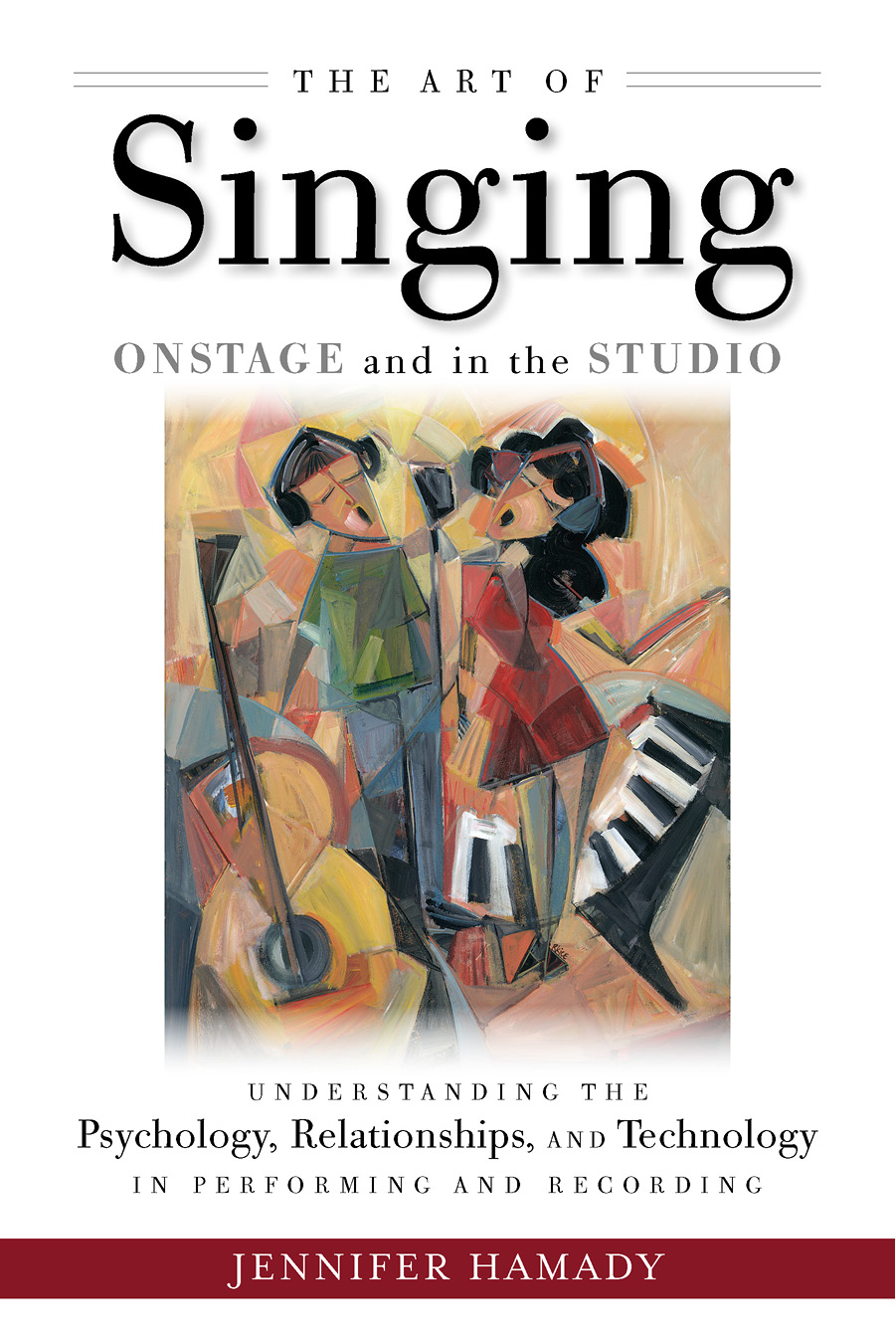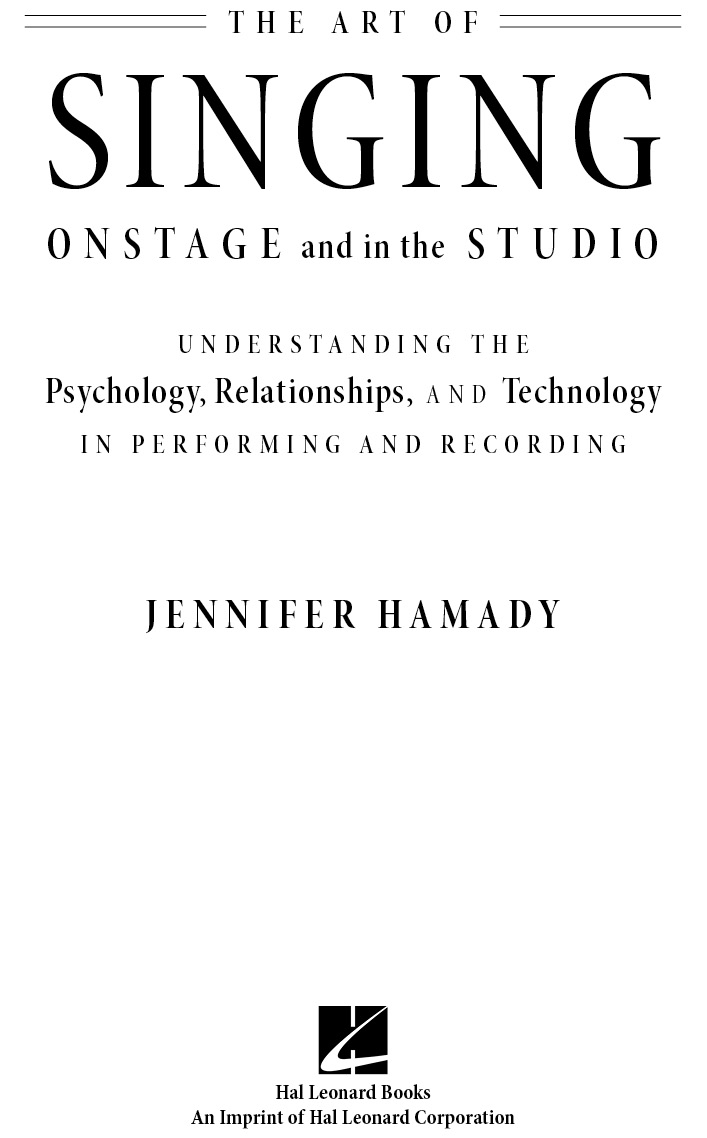Copyright 2016 by Jennifer Hamady
All rights reserved. No part of this book may be reproduced in any form, without written permission, except by a newspaper or magazine reviewer who wishes to quote brief passages in connection with a review.
Published in 2016 by Hal Leonard Books
An Imprint of Hal Leonard Corporation
7777 West Bluemound Road
Milwaukee, WI 53213
Trade Book Division Editorial Offices
33 Plymouth Street, Montclair, NJ 07042
Permissions can be found , which constitutes an extension of this copyright page.
Printed in the United States of America
Book design by Lynn Bergesen
Library of Congress Cataloging-in-Publication Data
Names: Hamady, Jennifer, author.
Title: The art of singing onstage and in the studio : understanding the
psychology, relationships, and technology in performing and
recording / Jennifer Hamady.
Description: Montclair : Hal Leonard Books, 2016. | Includes index.
Identifiers: LCCN 2016004623 | ISBN 9781495050268 (pbk.)
Subjects: LCSH: SingingInstruction and study. | SingingPsychological
aspects. | Sound recordingsProduction and direction. | Music
tradeVocational guidance.
Classification: LCC MT820 .H225 2016 | DDC 783/.043dc23
LC record available at http://lccn.loc.gov/2016004623
www.halleonardbooks.com
Contents
My sincerest thanks...
To the entire Hal Leonard family, including John Cerullo and Marybeth Keating, for bringing this book to life, as well as Ben Culli and J. Mark Baker for helping to start the whole Art of Singing adventure. And to Mike Symonds, again, who is responsible for it all, thanks to the worlds most serendipitous meeting and introduction.
To Rachel Kice for her wonderful friendship, her constant inspiration, and the beautiful and perfect painting she created for the cover of this book.
To John and Lucas... the loves of my life, my two best buddies, and the brightest stars in my sky.
And to you. For your e-mails, calls, and visits... for all of your wonderful questions, feedback, thoughts and ideas... Thank you for being so vulnerable and brave. For daring to not only take on finding your voices, but also discovering who you are. And for allowing me to be a small part of that incredible process. You all are the reason I wrote this book; you all are the reason I love doing what I do.
From the bottom of my heart, I thank you.
Part One
Setting the Stage
I wrote my first book, The Art of Singing , to help singers find more joy and ease in their singing. Because at one time, Id lost both.
When I went to college to study voice, what had always been an effortless process for me became technical and confusing. Try as I might, learning how to sing with my intellect rather than my body and its wisdom in charge just didnt work. My once largely automatic voice became something I had to think and overthink about, resulting in physical tension and frustration.
Looking around my program and, later, at my fellow singers in the studio and on tour, I noticed that I wasnt the only one struggling with this common approach. It seemed the more we all tried to learn, the less we were sure of.
With time, as well as some marvelous guidance, I came to realize that the way I had originally interacted with my voice was the right one, and that setting aside this precious, intuitive relationship would never generate lasting results. Only by once again trusting myself would I be able to allow my voice to develop as it always had... with it, rather than me, leading the way.
I thankfully found my way back to that wonderful place of trust, joy, and ease. And then became determined to help others to do the same.
Since the release of The Art of Singing , it has been such an incredible pleasure and privilege to connect and work with so many of you. Watching you discover and rediscover your voices has brought full circle the determination and hope that led me to write the book. I am so impressed and inspired by your experiences, and as always, look forward to hearing more about your adventures!
As I mentioned in the preface of The Art of Singing , learning about the voice is an ongoing exploration. There is always something new to discover, which I find myself doing on a regular basis.
This includes the expanding notion of what singing entails. While having a great voice is important, becoming a successful singer today requires much more than talent and training. Timing, whether we are business savvy, our ability to make critical decisions, and our tolerance for pressure and stress are far more important than many people realize when starting their careers (and even for some who have been in the industry for a long time).
There are many challenging issues singers encounter on the path to success, though I have found three to be particularly critical as well as problematic. In spite of their importance, however, they arent always sufficiently addressed in training and, sometimes, theyre not discussed at all.
This is a tremendous shame, because without the proper attention, any one of the three can (and often does) stop a career dead in its tracks. And in combination, they can destroy it altogether.
They are:
Dealing with performance and performance anxiety effectively
Managing technology onstage and in the studio
Interacting with the men and women who facilitate that technology
I got to know my voice as a part of who I am, not a thing that I do. And because I have always seen the voice as an extension of myself, I am able to sing without having to think about it.
Carrie Manolakos, Broadway Actress and Recording Artist
I have always been fascinated by performance anxiety. Its incredible to think of the power it has to devastate our performances and our enjoyment of them, to say nothing of how slippery it can be when trying to address and resolve it. As both a performer and a coach, Ive marveled at how hard people work to try to eradicate their fear, only to have it become an even more engrained fixture in their performances and careers.
What causes this discomfort, and why is it so pervasive and, in many cases, crippling? Why are some people able to blissfully share themselves and their talents with the world, while others are riddled with nervousness and even panic?
Most importantly, what can we do about it?
For starters, we need to back up and take a look at our fundamental beliefs about performance and the voice itself. We all know what the words mean, but our modern definitions and understandings dont honor what they are by design: natural extensions of ourselves into the world .
Personally, I never thought of myself as a singer. This happy accident freed me from psychological considerations of any kind.
Silvia Nakkach, Author, Free Your Voice
The voice is not a thing that you have. It is a part of you. We are our voices and performance, by nature, is the act of sharing who we are.
Today, however, our culture puts far too much pressure on singing and performing, equating talent and success with personal value and worth... burdens they were never meant to carry.
Together, well explore how these faulty and exhausting ways of thinking came into beingas well as how to overcome themso that we can reclaim the joy, freedom, and fearless self-expression that is the birthright of every one of us.
As singers, we get training in voice, auditioning, and, occasionally, some business in schools and conservatories. Yet knowing how to use todays technical tools is the thing that will make or break you.


